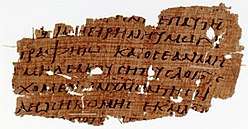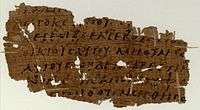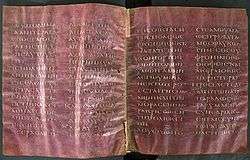Matthew 10
Matthew 10 is the tenth chapter in the Gospel of Matthew in the New Testament section of the Christian Bible. Matthew 10 comes after Jesus had called some of his disciples and before the meeting with the disciples of John the Baptist. This section is also known as the Mission Discourse or the Little Commission, in contrast to the Great Commission (Matthew 28:18–20). The Little Commission is directed specifically to the Jewish believers of the early church, while the Great Commission is to all nationalities. The Pulpit Commentary suggests that Jesus' message in this discourse "was hardly likely to have been remembered outside Jewish Christian circles".[1]
| Matthew 10 | |
|---|---|
Gospel of Matthew 9:23–10:17 on Codex Sinaiticus, made about AD 330–360. | |
| Book | Gospel of Matthew |
| Category | Gospel |
| Christian Bible part | New Testament |
| Order in the Christian part | 1 |
| Gospel of Matthew |
|---|
|
Chapters |
Matthew names the twelve apostles, or "twelve disciples", in verses 1 to 4 and the remainder of the chapter consists almost entirely of sayings attributed to Jesus. In this chapter, Jesus sends out the apostles to heal and preach throughout the region and gives them careful instruction. Many of the sayings found in Matthew 10 are also found in Luke 10 and the Gospel of Thomas, which is not part of the accepted canon of the New Testament.
Text


The original text was written in Koine Greek. This chapter is divided into 42 verses.
Textual witnesses
Some early manuscripts containing the text of this chapter are:
- Papyrus 110 (3rd/4th century; extant verses 13–15, 25–27)[2][3]
- Uncial 0171 (~300; extant verses 17–23, 25–32)
- Codex Vaticanus (325–350)
- Codex Sinaiticus (330–360; complete)
- Codex Bezae (~400)
- Codex Ephraemi Rescriptus (~450; complete)
- Codex Petropolitanus Purpureus (6th century)

The twelve
The text in verse 1 refers to "his twelve disciples" (Greek: τους δωδεκα μαθητας αυτου, tous dodeka mathetas autou). Verse 2 calls them "the twelve apostles":
²Now the names of the twelve apostles are these: The first, Simon, who is called Peter, and Andrew his brother; James the son of Zebedee, and John his brother; ³Philip, and Bartholomew; Thomas, and Matthew the publican; James the son of Alphaeus, and Lebbaeus, whose surname was Thaddaeus; ⁴Simon the Canaanite, and Judas Iscariot, who also betrayed him.
Verse 5 refers to them simply as "the twelve".
Verse 10
- nor bag for your journey, nor two tunics, nor sandals, nor staffs; for a worker is worthy of his food.[4]
Cross reference: Mark 6:8–9; Luke 9:3
- "Bag" (KJV: "Scrip"): Called "tarmil" in Hebrew as found in one Jewish commentary,[5] it is a large leather bag, which shepherds and travelers carried their food, and other things, hanging it around their necks.[6] The disciples were neither to carry money with them, nor any provisions for their journey.[6]
- "Two tunics" (KJV: "two coats", NABRE: "a second tunic"): supposedly one to wear during travel, and another to put on, when they came to their quarters.[6] Theologian John Gill suggests that "the disciples were not allowed change of raiment, either because superfluous, or too magnificent to appear in, or too troublesome to carry".[6]
- "Shoes": only sandals are allowed, according to the Gospel of Mark.[6] There seems to be a difference between shoes and sandals, as appears from the case of the plucking off the shoe, when a man refused his brother's wife:[7] if the "shoe" was plucked off it was regarded; but if the "sandal", it was not minded: this was the old tradition, though custom went against it. Sandals were made of harder leather than shoes,[8] and sometimes of wood covered with leather, and stuck with nails, to make them more durable;[9] though sometimes of bulrushes, and bark of palm trees, and of cork,[10] which were light to walk with.[lower-alpha 1] Of what sort these were, the disciples were allowed to travel with, is not certain[6].
- "Staffs" (KJV: "staves"): that is, more than one staff, which was sufficient to assist and lean upon during the journey. According to Mark, one staff was allowed, as though they might take a traveling staff, but not staffs for defense or to fight with (Matthew 26:55).[6] Now these several things were forbidden them, partly because they would be burdensome to them in traveling; and partly because they were not to be out any long time, but were quickly to return again; and mainly to teach them to live and depend upon divine providence. Since they were to take neither money, nor provisions with them, and were also to preach the Gospel freely, they might reasonably ask how they should be provided for, and supported, so Jesus said, that they should not be anxiously concerned about that, as he would take care that they had a suitable supply and would so influence and dispose the minds of such, to whom they should minister, as that they should have all necessary provisions made for them, without any care or expense of theirs.[6]
- "For a worker is worthy of his food" (KJV: "For the workman is worthy of his meat"): Jesus uses this proverbial expression to remark that the disciples are workmen, or laborers in his vineyard, and for doing their duty, they were entitled to all the necessaries of life.[6] This is their due and justified to give it to them, and on which they might depend.[6] So that this whole context is so far from militating against a minister's maintenance by the people, that it most strongly establishes it; for if the apostles were not to take any money or provisions with them, to support themselves with, it clearly follows, that it was the will of Christ, that they should live by the Gospel, upon those to whom they preached and though they were not to make gain of the Gospel, or preach it for filthy lucre's sake, yet they might expect a comfortable subsistence, at the charge of the people, to whom they ministered, and which was their duty to provide for them.[6]
Verse 13
- If the household [where you stay] is worthy, let your peace come upon it. But if it is not worthy, let your peace return to you.[12]
Commentator Dale Allison suggests that "your peace" refers to the peace promised "for the eschatological age" (e.g. Isaiah 52:7): How beautiful upon the mountains are the feet of him who brings good news, who proclaims peace. "The gift of peace is not just a social convention: the apostolic greeting should be understood as a sign of the inbreaking of the kingdom."[13]
Verse 18
- You will be brought before governors and kings for My sake, as a testimony to them and to the Gentiles.[14]
Cross references: Matthew 27:2
Verse 21
- Now brother will deliver up brother to death, and a father his child; and children will rise up against parents and cause them to be put to death.[15]
This prophecy of family strife is based upon Micah 7:6, which was thought to describe the discord of the latter days. The conviction that the great tribulation would turn those of the same household against one another was widespread.[13]
Verse 34
- "Think not that I am come to send peace on earth: I came not to send [or bring] peace, but a sword."[16][17]
This is a much-discussed passage, often explained in terms of the "apocalyptic-eschatological" context of the 1st century.[18]
R. T. France explains the verse, in context with the subsequent verse 35: "The sword Jesus brings is not here military conflict, but, as vv. 35–36 show, a sharp social division which even severs the closest family ties. … Jesus speaks here, as in the preceding and following verses, more of a division in men’s personal response to him."[19]
The text of Matthew's Gospel in the Book of Kells alters gladium, the Vulgate translation of makhairan "sword", to gaudium "joy", resulting in a reading of "I came not [only] to bring peace, but [also] joy".[20]
Verse 38
- And he who does not take his cross and follow after Me is not worthy of Me.[21]
- "Take his cross": is in the sense of "willingly to undergo the severe trials that fall to his lot" (2 Corinthians 1:5; Philippians 3:10); a figurative expression taken from the practice that "condemned criminals were compelled to take up their own cross and carry it to the place of execution" (Matthew 27:32; Luke 23:26; John 19:16)[lower-alpha 2][22]
Parallels in the Gospel of Thomas
Matthew 10 contains many parallels found in the Gospel of Thomas.
- Matthew 10:16 parallels saying 39 in the Gospel of Thomas.
- Matthew 10:37 parallels sayings 55 and 101
- Matthew 10:27b parallels saying 33a.
- Matthew 10:34–36 parallels saying 16.
- Matthew 10:26 parallels saying 5b.
See also
- Commissioning the Twelve Apostles
- Coming Persecutions
Notes
- Says R. Bar bar Chanah,[11] I saw R. Eleazar of Nineveh go out on a fast day of the congregation (Mev ldnob), "with a sandal of cork".
- Also in Artemid. ii. 56, p. 153; Plut. Mor. p. 554 A; Cic. de divin. i. 26; Valer. Max. xi. 7. apud Meyer's NT, Matthew 10:38
References
- Pulpit Commentary on Matthew 10, accessed 3 January 2017
- Cockle, Walter E. H. The Oxyrhynchus Papyri. Volume 45. London: Egypt Exploration Society, 1999. Pages 1–3.
- Comfort, P. W., & Barrett, D. P. (2001). The text of the earliest New Testament Greek manuscripts, pp. 656
- Matthew 10:10 NKJV
- Maimon. & Bartenora in Misn. Sheviith, c. 2. sect. 8. & in Celim. c. 16. 4. & 24. 11. & Negaim. c. 11. sect. 11.
- Gill, John, "Matthew", Exposition of the Entire Bible, Bible study tools, 10:10
- T. Hieros. Yebamot, fol. 12. 3. T. Bab. Yebamot, fol. 102. 1. & Menachot, fol. 32. 1.
- Gloss. in T. Bab. Yebamot, fol. 101. 1. & Bartenora in Misn. Yebamot, c. 12. sect. 1.
- Misn. Yebamot, c. 12. sect. 2. Maimon. Bartenora in Sabbat, c. 6. sect. 2. & Edayot, c. 2. sect. 8.
- T. Bab. Yoma, fol. 78. 2. Gloss. in ib. Maimon. Hilch. Shebitat. Ashur, c. 3. sect. 7.
- T. Bab. Yoma, fol. 78. 2. Juchasin, fol. 81. 1.
- Matthew 10:18 NKJV
- Allison, D., Matthew in Barton, J. and Muddiman, J. (2001), The Oxford Bible Commentary, p. 859
- Matthew 10:18 NKJV
- Matthew 10:21 NKJV
- Matthew 10:34 KJV
- Mathewes, Charles. Understanding Religious Ethics. p. 186.
- Cim, David. "The sword motif in Matthew 10:34". Theological Studies; Vol 56, No 1 (2000), 84-104. School of Theology, Australian Catholic University. doi:10.4102/hts.v56i1.1698.
- France, Tyndale New Testament Commentaries, Vol 1: Matthew (1985). 2nd ed (2008), p. 192. ISBN 978-1844742677.
- Nathan, George Jean Nathan; Henry Louis Mencken (1951). The American Mercury. p. 572.
The compilers of the late seventh century manuscript, The Book of Kells, refused to adopt St. Jerome's phrase "I come not to bring peace but a sword" (" ... non pacem sed gladium"). To them the phrase made no sense and they altered it ...
- Matthew 10:38 NKJV
- Meyer's NT Commentary on Matthew 10. Accessed 24 April 2019.
External links
| Wikimedia Commons has media related to Gospel of Matthew - Chapter 10. |
- Matthew 10 King James Bible - Wikisource
- English Translation with Parallel Latin Vulgate
- Online Bible at GospelHall.org (ESV, KJV, Darby, American Standard Version, Bible in Basic English)
- Multiple bible versions at Bible Gateway (NKJV, NIV, NRSV etc.)
| Preceded by Matthew 9 |
Chapters of the New Testament Gospel of Matthew |
Succeeded by Matthew 11 |